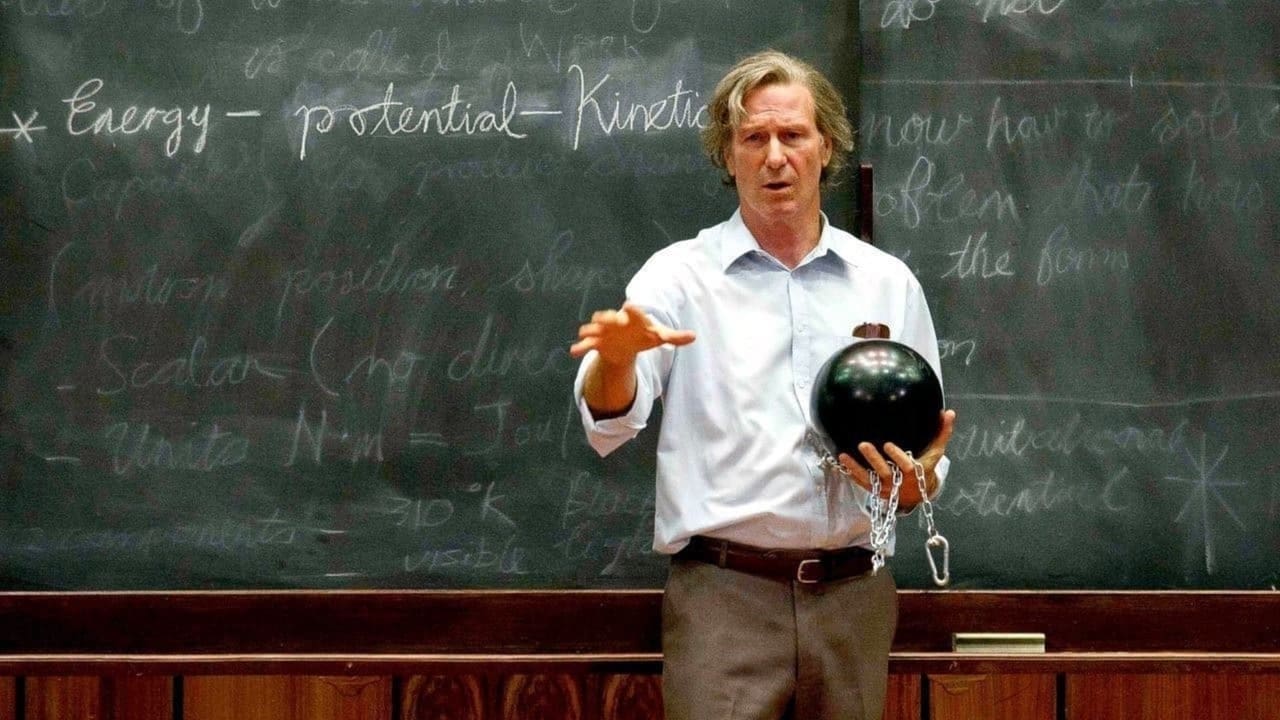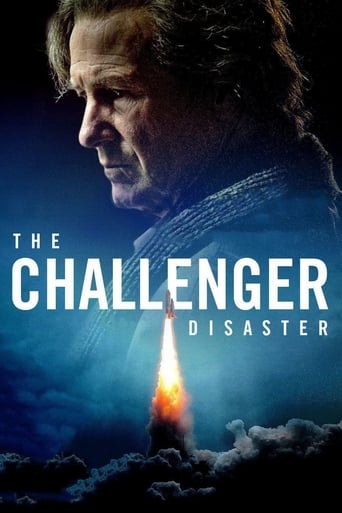

On the surface, this movie should have been a great one. Here we have a great true story, involving a relentless search for truth, a government agency cover-up, a secret confidential source, and a tragedy that shook the nation. Coupled with a hero in the charismatic, eccentric and brilliant Richard Feynman, this could easily have been as good or better than say "Spotlight", or any other great movie of that genre. Yet, this movie, although OK, somehow misses. It's not great, has no great powerful moments, nor particularly funny or self deprecating. Something to watch when nothing else is on and no more.Some of the blame must go to the portrayal of the main character, on which the entire story revolves - prof. Richard Feynman. One of the greatest physicists in history, with a crazy rich past and eccentricities that are legendary, and he is simply boring! It is clear to me that neither William hurt who plays him, nor the director has bothered to watch any of his many televised lectures ind interviews. First of all - the famous Brooklyn accent. Than the constant cocky smile and sharp humor. The many anecdotes and metaphors that are often his way of explaining. Non of it are present here. If it were up to me Alan Alda would play him as he is both sorta looks like him and is funny, serious and can do a great accent. Also the constant emphasis on his illness is over the top and distracting.About the only really good thing I can attribute to this film is it's uncharacteristic accuracy. I didn't notice any factual errors, and that is rare in Hollywood.In summation, this is a mediocre movie, that with a better cast and writing staff could have been a great one. Too bad!
... View MoreThe Challenger Disaster (2013)*** 1/2 (out of 4) Made-for-TV drama based on the investigation by Dr. Richard Feynman (William Hurt) in regards to the Challenger disaster that took place on January 28, 1986. THE CHALLENGER DISASTER is about as good as a movie produced for television can get. It features an amazing performance by Hurt, a story that is quite gripping and it all plays out like a well structured thriller that will have you on the edge of your seat even if the findings of the report are all well-known by this point. What really shocked me about this film is simply how terrific Hurt is. Hurt, at one time, was considered to be one of the greatest actors working but things in his personal life pretty much took all the spotlight and the attention on his skill went away. Watching him perform here was simply amazing because he really does give one of the best performances of the year and if this thing had been made for the theater then an Oscar-nomination would be guaranteed. I thought the performance was downright flawless as this character was so well-rounded and detailed that the actor simply took everything and nailed it. Feynman was battling cancer while also having to deal with the pressure of this case and watching Hurt play both things was simply divine. The supporting players are also extremely good with Bruce Greenwood, Brian Dennehy and Joanne Whalley all delivering strong work. Director James Hawes does a very good job at keeping the viewer on the edge of their seats as he really turns this into a strong thriller. I liked the way that he managed to make you understand the need for certain people to cover up what really happened and I think the film is fair in showing why many feared that the truth might lead to no more space missions. The entire film treats everyone with the highest amount of respect, which makes for a much better movie. THE CHALLENGER DISASTER is without question a highly entertaining film and it contains one of the best performances that you're going to see.
... View MoreIn 1986, the United States experienced possibly the worst space flight disaster in NASA's history up until that time. (The fire which occurred during the testing of Apollo 1 in 1967 was probably the worst before Challenger.) With a disaster of this magnitude, then President Reagan formed a board of inquiry to determine the cause of the Challenger's untimely explosion which occurred less than 1.5 minutes into its launch. Most of the members of the commission were government, military, and NASA insiders such as astronauts Neil Armonstrong and Sally Ride, Air Force General Donald Kutyna, and William P. Rogers, former cabinet member of presidents and adviser to President Reagan. However, one board member was not only NOT an insider but a Nobel Laureate in Physics: Dr Richard Feynman. The present film chronicles the investigation through the eyes of Feynman, played convincingly by William Hurt, regarded as a bit of a maverick who did not understand the magnitude of consequences if the full and possibly ugly truth were ever laid bare before public scrutiny.At the time of the disaster, Feynman was teaching physics at the California Institute of Technology. One of his former students, a NASA insider, recommends the professor become involved with the commission. From the first, Feynman clashes with the Director of the commission Rogers (Brian Dennehy), who is at first more worried about NASA's reputation than finding the cause of the Challenger disaster. Feynman begins a bit of rogue investigative work which frustrates other members of the commission, who are worried that reputations and business contracts could be be jeopardized by the findings.Feynman then befriends General Donald Kutyna (Bruce Greenwood), who turns out to be an invaluable ally in the investigation. Kutyna explains to Feynman that the politics surrounding such an investigation often becomes messy, even ugly. People try to veil the truth, often with lots of scientific jargon, fearing that reputations, positions, and even careers might be compromised if unflattering facts come into the spotlight. At the same time, since Feynman is an outsider, he is much more free to ascertain the truth than other members. Then the physics professor receives a strange message which says "it's just ivory soap". Late in the film, Feynman makes a fascinating presentation of his findings to the other commission members. After the credits, video footage of the real Feynman making the identical presentation is shown as a kind of epilogue or coda.A compelling and thoroughly entertaining insiders' look into a commission of inquiry appointed by the US Government. While the need to find the truth is what the public expects, they don't often see the political shenanigans which often occur when such an investigation embarks on its task. The Warren Commission, the mishandled board of inquiry formed to investigate the assassination of President John F. Kennedy, made decisions which were above and beyond the goal of finding the truth, such as shielding crucial pieces of evidence from other board members for fear that such exposure would embarrass and/or infuriate the Kennedy family. (The Warren Commission's failures would fuel conspiracy theories for decades.) The Challenger Commission (or Rogers Commission) could have fallen into the same trap. However, because of the integrity of several of the members of the board, the truth of the Challenger disaster was finally revealed. And as a result, NASA made far-reaching improvements in its shuttle technology. Sadly, the Shuttle Disaster Commission was Feynman's last undertaking which received national attention. Feynman would die of cancer in 1988 at the age of 69.
... View MoreAdmirably done story of physicist Richard Feynman's involvement in figuring out the reasons for the explosion of the space shuttle Challenger in 1988.Three agencies were involved in deciding to launch that freezing morning -- NASA, Raytheon, and Morton-Thiokol. This isn't made clear in the film, because the film is about Richard Feynman. But a New Yorker feature article years ago described what the agencies did about their doubts. Calls were made back and forth between the experts at each agency, each anxious to "check its six o'clock", and the question being asked gradually underwent evolution -- from "Should we launch?" to "Why SHOULDN'T we launch?" The results were disastrous.A committee was formed to investigate the causes of the failure, with Feynman being the only independent members, all the others tied up with the military or with political considerations. But this isn't one of those dumb and oversimplified stories in which there is some sort of military/industrial conspiracy against the whistleblower. It belongs to the genre but is a pretty good example of it. So was the more commercially oriented "The Pentagon Wars." An example of a dumbed-down rendition is "The Insider," which really has little to say and shamelessly invents incidents to hype the drama.William Hurt captures Feynman's personality with accuracy. Not his speech or his gestures. It's not an impression. But he has a grasp on Feyman's inner character -- devoted to science and outspoken. Feynman was actually quite a guy and might be described as abrasive. He didn't hesitate to demolish the ideas of others, whether they were equals or subordinates. He didn't do it viciously. He simply pointed out how stupid the notions were and then went on about his business.The climactic scene is unforgettable. All the engineers (who generally hate physicists for having their heads in the clouds) are testifying before the committee and throwing up a blizzard of jargon about "ambient temperatures" and "Kelvin coefficients" and directions to "the Wheatstone Bridge" and other unfathomable cant in order to keep the water so murky that no one can detect their own part in the catastrophe. I won't give away the climax except to say that Feynman pulls a "Bill Nye, The Science Guy" stunt that shuts all the connivers up and embarrasses the experts.The BBC put this out. I suppose they could afford to be a little less careful with American political sensibilities. William Hurt and his scowl of amazement is about perfect. Feynman's illness isn't dwelt on for sympathetic effect but it was real enough; he died a short time later.
... View More